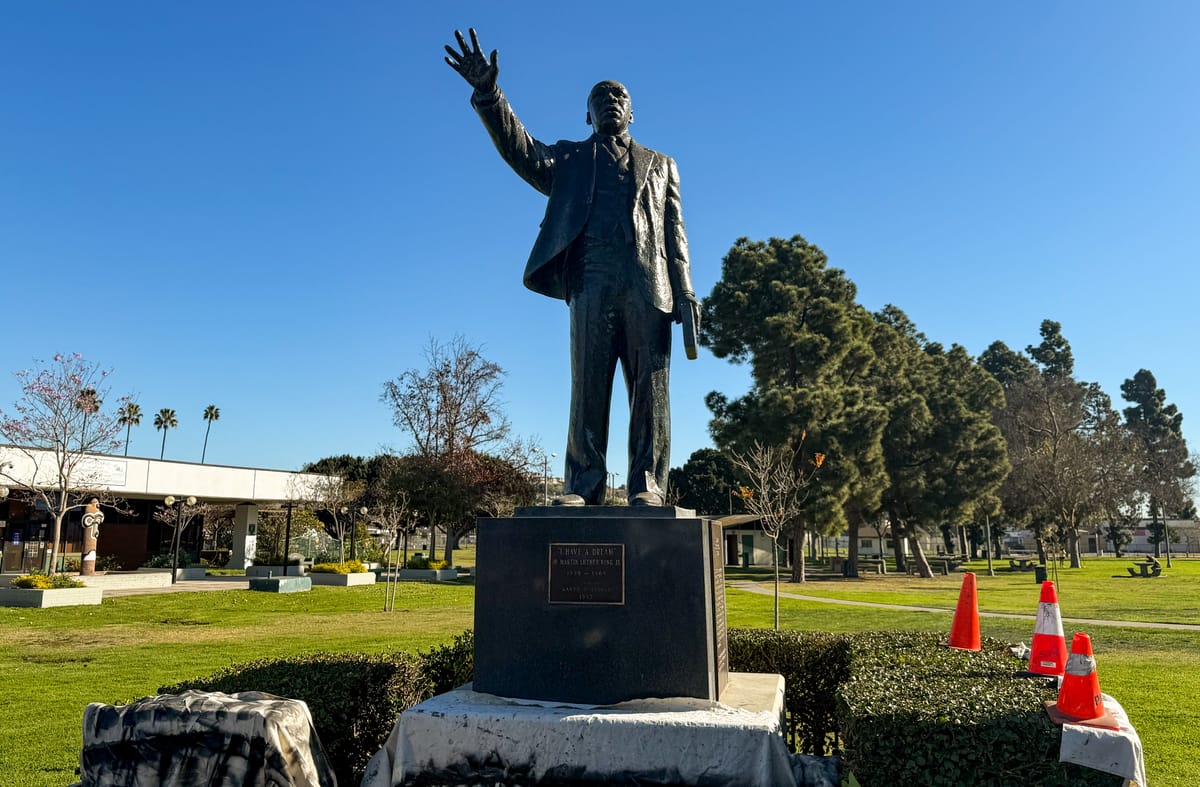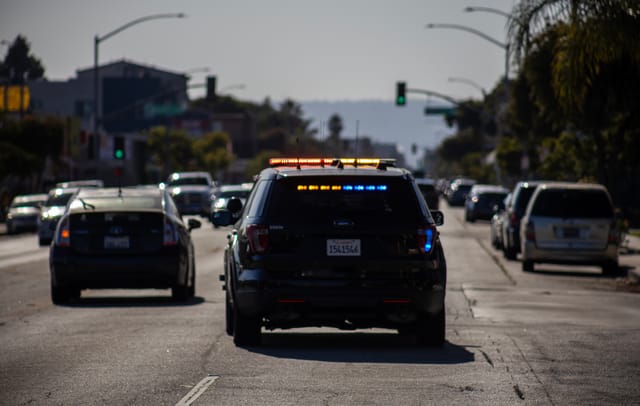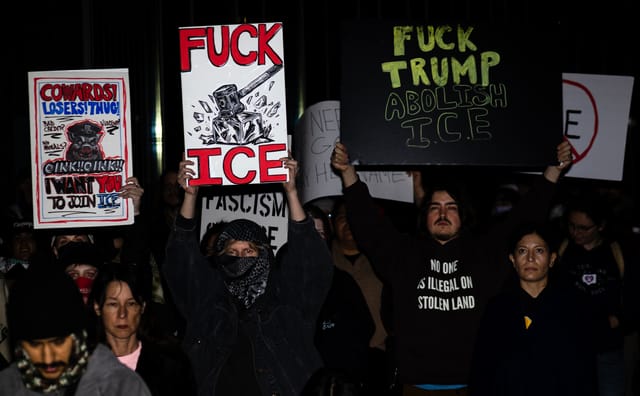Column: Long Beach's MLK Parade sparks outrage over lack of Black representation
Community members protest the fact that just one of the five individuals chosen to be a Grand Marshal in Saturday's Martin Luther King Jr. Parade is Black.

"We merely bring to the surface the hidden tensions that are already alive." — Dr. Martin Luther King Jr.
These words, penned by Martin Luther King, Jr. in 1963 in a Birmingham jail cell, resonate deeply today. Since his assassination and the conclusion of the Civil Rights Movement, society has often treated his words as sacred scripture, cherry-picking the ones that fit whatever current narrative needs promoting.
While many highlight King's teachings on unity and peace, they often overlook his stark warnings about the country's enduring failure to treat Black Americans equally.
"Until we commit ourselves to ensuring that the underclass is given justice and opportunity, we will continue to perpetuate the anger and violence that tears the soul of this nation," King said shortly before his death in 1968. "I fear I am integrating my people into a burning house."
The truth is, he did. Before integration, Black communities thrived with self-reliance, boasting their own banks, schools, businesses and community services. Black dollars circulated within the community, fostering economic independence.
Today, the typical Black household has less than one-tenth the wealth of the typical White family, nearly unchanged since the 1960s, according to Moritz Kuhn, an economics professor at the University of Bonn.
"Justice for Black people will not flow into this society merely from court decisions nor from fountains of political oratory… White America must recognize that justice for Black people cannot be achieved without radical changes in the structure of our society." - Dr. Martin Luther King Jr.
Although federal reforms like the Civil Rights Act of 1964 brought initial gains in Black income during the 1970s, those advances were short-lived. By 2019, the earnings gap between Black and White Americans had returned to 1970s levels, according to Samuel Myers Jr., director of the Roy Wilkins Center for Human Relations and Social Justice at the University of Minnesota.
Researchers cite weakened political efforts to combat structural racism as a contributing factor. This is especially evident in Long Beach, where Black erasure has sparked outrage over this year's Dr. Martin Luther King Jr. Parade, which will take place on Saturday, Jan. 18.
"Loose and easy language about equality, resonant resolutions about brotherhood fall pleasantly on the ear, but for the Negro there is a credibility gap he cannot overlook." - Dr. Martin Luther King Jr.
This year's parade planning, led by City Councilmember Suely Saro of the Sixth District, has drawn criticism for its selection of Grand Marshals. Instead of prioritizing Black leaders who embody King's fight for justice, the list includes a Cambodian American, a Latina nonprofit leader and a White philanthropic couple.
Only one Black person, long time civil rights leader Dale E. Clinton, who the Long Beach Historical Society considers to be one of the "mothers" of the Black community, made the list.
While Saro did not respond to the Watchdog's specific questions regarding the selection process, she defended the choices in a social media post, saying, "Long Beach is committed to honoring King's legacy by working to eliminate systemic barriers, promote shared prosperity and ensure all voices are valued and heard in the pursuit of racial equity."
However, her statement that "all voices are valued and heard in the pursuit of racial equity" is tone-deaf, with community members likening it to the dismissive "All Lives Matter" rhetoric.
Then she continued, saying that the "2025 Grand Marshal selection follows the practice of previous Sixth District Councilmembers and former Vice Mayor Dee Andrews, who have honored racially and ethnically diverse Grand Marshals."
Referring to Andrews, who hasn't served on the City Council since 2020, is a textbook example of scapegoating. Rather than addressing the Black community's outrage over their lack of representation, Saro deflects by saying that a former Black city council member did the same thing.
There is truth to Saro's claim. On social media, Saro highlighted the Black erasure committed by Andrews in previous years, posting lists of former Grand Marshals. The lists include a wide variety of activists and community leaders, but few were actually Black people.
What's more, Saro does have some support in the Black community. Sharon Diggs-Jackson, a Black organizer of this year's parade, defended Saro’s Grand Marshal selection.
She argued that the inclusion of Black student-athletes and coaches as Grand Marshals from Poly and Wilson High Schools—honored as California Interscholastic Federation champions—should quell the community's outrage.
"Hundreds of volunteer hours that Black people have put into the event will be evident," she said.
But community members at planning meetings say organizers ignored their parade suggestions and abruptly cut off communication.
According to Diggs-Jackson, Saro ended communication with volunteers.
"At the request of the Council staff, we were asked to hold off on providing updates until the City had approved specific details," Diggs-Jackson wrote in an email to volunteers. "We appreciate your patience and understanding as we continue advocating for a meaningful and impactful celebration."
Bill Breaker, who volunteered his time to enhance youth engagement, believes Saro's office's lack of transparency, coupled with the majority of non-Black Grand Marshals, fails to embody King's core values or the principles of the civil rights movement.
"We want to celebrate our local Black leaders, not the friends of city officials," said Breaker. “It's evident the city is over representing Martin Luther King's views on integration to co-op a parade meant to honor Black excellence within the city."
Many in the community agree with Breaker. A letter signed by more than 200 community members urges Saro's office to publicly acknowledge the harm caused by the planning decisions and to transfer the parade's organization to a Black-led nonprofit by 2026.
The letter also emphasizes the need for culturally specific celebrations, such as Long Beach's Cambodian New Year Parade or Dia de los Muertos, which honor their respective cultures with care.
Although the MLK parade has long been a glaring example of Black erasure in Long Beach, the responsibility to uphold Black excellence and honor King's legacy cannot rest solely on Saro or any single political leader.
Black leaders who remain silent while holding seats that could effect change bear some responsibility for the erasure and leaving the same problems for the next generation.
King's legacy uplifts Black voices and inspires future generations. Anything less is a disservice to his memory and the fight for equality he championed.
To join the fight against anti-Blackness during the MLK parade you can sign the petition mentioned above here.
"Every man of humane convictions must decide on the protest that best suits his convictions, but we must all protest." - Dr. Martin Luther King Jr.
We need your support.
Subcribe to the Watchdog today.
The Long Beach Watchdog is owned by journalists, and paid for by readers like you. If independent, local reporting like the story you just read is important to you, support our work by becoming a subscriber.





